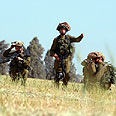
Eitan Haber
Photo: Shalom Bar Tal

A multicultural IDF
Photo: AFP
Welcome to the IDF 2008. The combat forces of this IDF are made up of, mostly, residents of outlaying areas, the children of new immigrants from Russia and the former Soviet Union, Bedouins, Druze – what we used to refer to as “the second Israel” once upon a time. Well, that “second Israel” has moved up.
When we look at the casualties of the latest military operations, and maybe even before that, we can see the IDF’s up-to-date image: Oleg, Leonid, Maxim, Peter, Ahmed, Muhammad, Wahid, Wasim. Their parents live in places like Kiryat Gat, Afula, Horfish, and the al-Huzeil tribe.
Meanwhile, the dictionary of names saw the disappearance of the likes of Ran and Shahar and Shahak, Tsafrir and Segev and Yinon, Gonen and Netzer, just like we saw the disappearance of Herzliya and Ramat Hasharon, Tel Aviv and Netanya, Ramat Gan, Bnei Zion, and Bnei Atarot.
Tough tests ahead
This does not mean, heaven forbid, that there are no combat soldiers these days who come from the abovementioned communities and from other places. There certainly some, even many, and they are good ones – yet the “trend,” the direction, and the tone in the IDF today are set by members of the “second Israel.”
If you think about it, IDF Chief of Staff Gabi Ashkenazi is also an example of this – the son of immigrant parents, grew up in a moshav community, a member of the Golani Brigade, which for generations has elicited praise but was not considered for a long time as the army’s “cream of the crop.” Many of Ashkenazi’s predecessors were from the country’s “Mayflower” families and came from what were considered the true elite units.
Is this good for the IDF? We should hope and assume that it is. In any case, nobody can change this trend. We should accept it as it is and do everything in order to become better, because there are apparently still difficult tests ahead of us.
Leaders in Israel have always said that the “current generation” is better than their own generation when it comes to the military and to civilian life. Now, the burden of proof is on the “current generation.”















